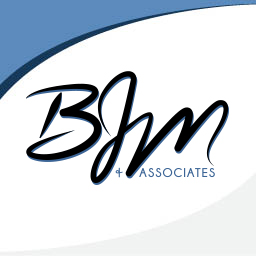LTS can be involved in engagements of any scale: from fundamentally changing how you run your organization to become more effective and efficient, from leaders to front line staff, to running process and quality improvement projects and assessments that produce improvements for a wide variety of businesses. LTS has worked successfully with clients in healthcare, agriculture, education, all levels of government, and manufacturing. You can read success stories in each of these areas here, and you can see our client list here.
What principles underlie our clients’ success? The process improvement methodology of Lean is built on a foundation of respect for people. This means both engaging and challenging everyone to perform at the top end of her or his skill set. The foundation is created, communicated, led, and facilitated through the three pillars, or principles, of Lean, as illustrated below.
Leadership, Capacity, and Infrastructure: the Three Pillars
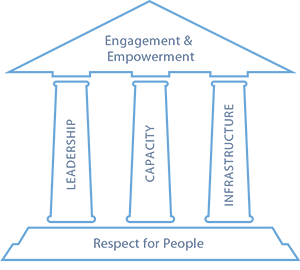
Leadership
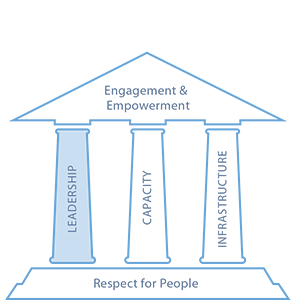
Leadership is the cornerstone of system transformation and must be one of the first engagement strategies of organizational change. We help leadership turn their day from 70% fire-fighting to 70% proactive activities supporting system improvement.
Leadership training is a core part of LTS’s service offerings. Bonita Matushewski, LTS COO, has provided leadership training to many public and private sector organizations in order to lay the foundation for improvement events and ongoing quality initiatives also led by the company.
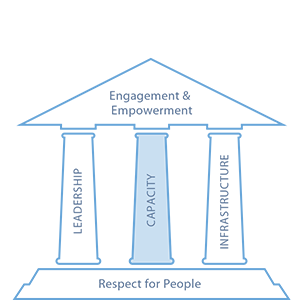 Capacity is about teaching individuals within the organization how to become self-sufficient. LTS works to provide the skills, knowledge, tools, and mentorship necessary to create a self-sustaining organization moving towards ambitious goals. See Bonita talking about capacity building here.
Capacity is about teaching individuals within the organization how to become self-sufficient. LTS works to provide the skills, knowledge, tools, and mentorship necessary to create a self-sustaining organization moving towards ambitious goals. See Bonita talking about capacity building here.
Mentorship is the key to the successful implementation of process improvement and change management in any organization. LTS uses a specific mentorship model called the mentorship passport that outlines and tracks all the milestones, deliverables, and mentorship touch points to be completed as part of any project that we do. The model typically includes e-learning, group sessions, conference calls and webinars, and one-on-one components. The training passport allows students to stay on track and complete the project in a timely manner. By providing a structured approach to mentorship, learning and ROI are dramatically increased.
Infrastructure
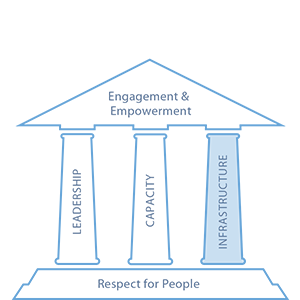 Infrastructure refers to the tools, templates, documentation and processes needed to facilitate a consistent model. LTS provides simple, easy-to-use templates for use organization-wide. This helps to create a standard work process to follow when doing change management or quality improvement work. In addition, LTS works with organizations to create and establish their own standards that best suit the customer’s situation.
Infrastructure refers to the tools, templates, documentation and processes needed to facilitate a consistent model. LTS provides simple, easy-to-use templates for use organization-wide. This helps to create a standard work process to follow when doing change management or quality improvement work. In addition, LTS works with organizations to create and establish their own standards that best suit the customer’s situation.
The Roof: Engagement and Empowerment
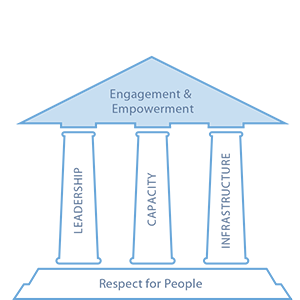 The Roof: Engagement and Empowerment
The Roof: Engagement and Empowerment
The final component of transformation, the roof if you will, is engagement and empowerment of everyone working in the system. Through leadership, standard work, system designs, focusing on specific metrics, and educating everyone in the change methodology, people are empowered to make appropriate decisions and constantly celebrate their success.
How do we implement these principles in customer projects? At the core of LTS’s business functions are:
- Training and development in process improvement, including mentorship programs
- Quality improvement (QI) initiatives
Typically our large scale projects include all the above components: training supported by mentorship, and quality improvement initiatives.

